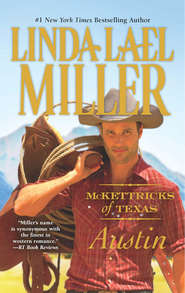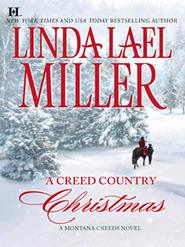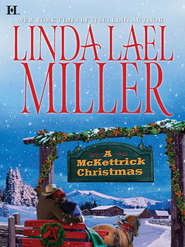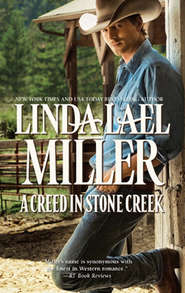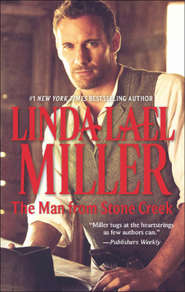По всем вопросам обращайтесь на: info@litportal.ru
(©) 2003-2024.
✖
The Christmas Brides: A McKettrick Christmas
Автор
Год написания книги
2019
Настройки чтения
Размер шрифта
Высота строк
Поля
“I’m not ready to say ‘you’re welcome,’” he snapped. “Leaving that car, especially alone, was a damnably foolish thing to do.”
“If you expect an apology, Dr. Shane, you will be sorely disappointed. Someone had to do something.”
The fire crackled merrily in the stove, and a little heat began to radiate into the frosty caboose. Morgan reached up to adjust the damper, still seething.
“Don’t talk,” he advised, sounding surly.
Lizzie straightened her spine. “Of course I’m going to talk,” she told him pertly. “I have things to say. We need to bring everyone from the passenger car. It’s safer here—and warmer.”
“We aren’t going to do anything. You are going to stay put, and I will go back for the others.” He leveled a long look at her. “So help me God, Lizzie, if you set foot outside this caboose—”
She smiled, getting progressively warmer, catching the first delicious scent of brewing coffee. She’d probably imagined that part, she decided.
“Why, Dr. Shane,” she mocked sweetly, batting her eyelashes, “I wouldn’t think of disobeying a strong, capable man like you.”
Suddenly he laughed. Some of the tension between them, until that moment tight as a rope with an obstreperous calf running full out at the other end, slackened.
It gave Lizzie an odd feeling, not unlike dangling over the side of a cliff with only a root to hold on to and the jaws of a ravine yawning below.
She blushed. Then her practical side reemerged. “I tried the door on the freight car,” she said. “But I couldn’t get in. If we’re lucky, there might be food inside.”
“Oh, we’re lucky, all right,” Morgan responded, his amusement fading as reality overtook him again. The sun was coming up, and Lizzie knew as well as he did that even its thin, wintry warmth might thaw some of the snow looming over their heads, set it to sliding again. “We’re lucky we’re alive.” He studied her for a long moment. Then he snapped, “Wait here.”
Frankly not brave enough to risk another plunge over the cliff-side, McKettrick or not, Lizzie waited. Waited when he left. Waited for the coffee to brew.
He brought the baby first.
Lizzie held little Nellie Anne and bit her lip, waiting.
Next came Jack, riding wide-eyed on Morgan’s shoulders, his little hands clasped tightly under the doctor’s chin.
After that, Mrs. Halifax. Her arm still in its sling, she fairly collapsed, once safely inside the caboose. Lizzie immediately got up to fill a coffee mug and hand it to the other woman. Mrs. Halifax trembled visibly as she drank, her two older children clutching at her skirts.
Whitley appeared, having made his own way, scowling. Still clutching his blanket, he looked even more like an overgrown child than before. When Mrs. Halifax gave him a turn with the cup, he added a generous dollop from his flask and glared at Lizzie while he drank. She’d seen him empty the vessel earlier; perhaps he had a spare bottle in his valise.
She did her best to ignore him, but it was hard, since he seemed determined to make his stormy presence felt.
The peddler arrived next, escorting the old woman, his jowls red with the cold. He’d brought his sample case, too, and he immediately produced a cup of his own, from the case, and poured a cup of coffee at the stove. “Hell of a Christmas,” he boomed, to the company in general, understandably cheered by the warmth from the fire and probably dizzy with relief at having made the treacherous journey between cars unscathed. He gave the cup to the elderly lady, who took it with fluttery hands and quiet gratitude.
Finally, John Brennan came, on his feet but supported by Morgan. The old man accompanied them, carrying Woodrow’s covered cage.
The peddler, after flashing a glance Whitley’s way, conjured more cups from his sample case, shiny new mugs coated in blue enamel, and gave them to the newer arrivals.
“I’m starving,” Whitley said petulantly. “Is there any food?”
“Starving!” Woodrow commented from his cage.
The grin Morgan turned on Whitley was anything but cordial. “I thought maybe we could count on you, hero that you are, to hike out with a rifle and bag some wild game,” he said.
Whitley reddened, looked for a moment as though he might fling aside the coffee mug he was hogging and go for Morgan’s throat. Apparently, he thought better of it, though, for he remained seated, taking up more than his share of room on the benchlike seat opposite Lizzie. Muttered something crude into his coffee.
Lizzie stood, approached Morgan. “I was thinking if we could find a way to—well, unhook this car from the next—”
“Stop thinking,” Morgan interrupted. “It only gets you in trouble.”
Lizzie felt as though she’d been slapped. “But—”
Morgan softened, but only slightly. Regarded her over the rim of his steaming coffee. “Lizzie,” he said, more gently, “it’s a question of weight. As shaky as our situation is, if we uncoupled the cars, we’d be more vulnerable, separated from the rest of the train, not less.”
He was right, which only made his words harder for Lizzie to swallow. She averted her eyes, only to have her gaze land accidentally on Whitley. He was smirking at her.
She lifted her chin, turned away from both Whitley and Morgan, and set about helping Mrs. Halifax make a bed for the children, using John Brennan’s quilt. That done, she turned to the elderly couple.
Their names were Zebulon and Marietta Thaddings, Lizzie soon learned; they lived in Phoenix, but Mrs. Thaddings’s sister worked in Indian Rock, and they’d intended to surprise her with a holiday visit. Having no one to look after Woodrow in their absence, they’d brought him along.
“He’s a good bird,” Mrs. Thaddings said sweetly. “No trouble at all.”
Lizzie smiled at that. “Perhaps I know your sister,” she said.
Mrs. Thaddings beamed. “Perhaps you do,” she agreed. “Her name is Clarinda Adams, and she runs a dressmaking business.”
Lizzie felt a pitching sensation in the pit of her stomach. There was no dressmaker in Indian Rock, but there was a very exclusive “gentleman’s club,” and Miss Clarinda Adams ran it. Cowboys could not afford what was on offer in Miss Adams’s notorious establishment, but prosperous ranchers, railroad executives and others of that ilk flocked to the place from miles around to drink imported brandy, play high-stakes poker and dandle saucy women on their knees.
Oh, Miss Adams was going to be surprised, all right, when the Thaddingses appeared on her doorstep, with a talking bird in tow. But the Thaddingses would be even more so.
Lizzie felt a flash of mingled pity and amusement. She patted Mrs. Thaddings’s hand, still chilled from the perilous journey from one railroad car to another, and offered to refill her coffee cup.
Once they’d finished off the coffee and started a second pot to brewing, Morgan and the peddler set out to break into and raid the freight car.
As soon as they were gone, Whitley approached Lizzie, planted himself directly in front of her.
“If I die,” he told her, “it will be your fault. If you hadn’t insisted on bringing me into this wilderness to meet your family—”
Despite a dizzying sting—for there was truth in his words, as well as venom—Lizzie kept her backbone straight, her shoulders back and her chin high. “After staying alive,” she said, with what dignity she could summon, “my biggest problem will be explaining you to my family.”
With a snort of disgust, he turned on one heel and strode to the other side of the car.
And little Ellen tugged at the sleeve of the oversize conductor’s coat Lizzie had been wearing since the day before. “Do you think St. Nicholas will know where we are?” she asked, her eyes huge with worry. “Jack’s had a mean hankerin’ for that orange ever since Mama told us we could hang up stockings this year.”
“I’m absolutely certain St. Nicholas will know precisely where we are,” Lizzie told Ellen, laying a hand on her shoulder. “But we’ll be in Indian Rock by Christmas Eve, you’ll see.”
Would they? Ellen looked convinced. Lizzie, on the other hand, was beginning to have her doubts.
CHAPTER THREE
THE CABOOSE, although not much safer than the passenger car, was at least warm. When Morgan and the peddler returned from their foray, they brought four gray woolen blankets, as many tins of canned food, all large, and a box of crackers.
“There was a ham,” the peddler blustered, red from the cold and loud with relief to be back within the range of the stove, “but the doc here said it was probably somebody’s Christmas dinner, special-ordered, so we oughtn’t to help ourselves to it.”






